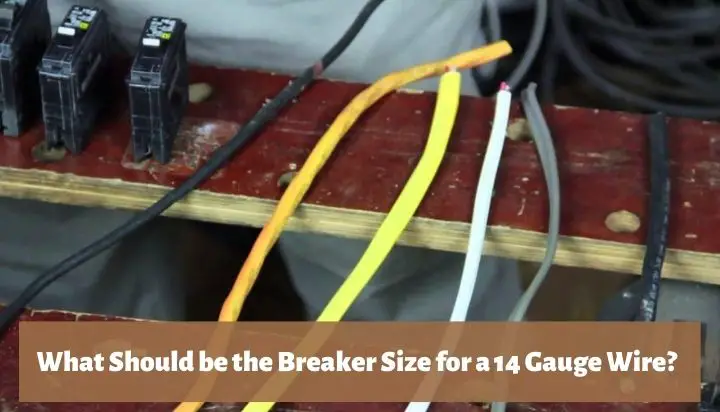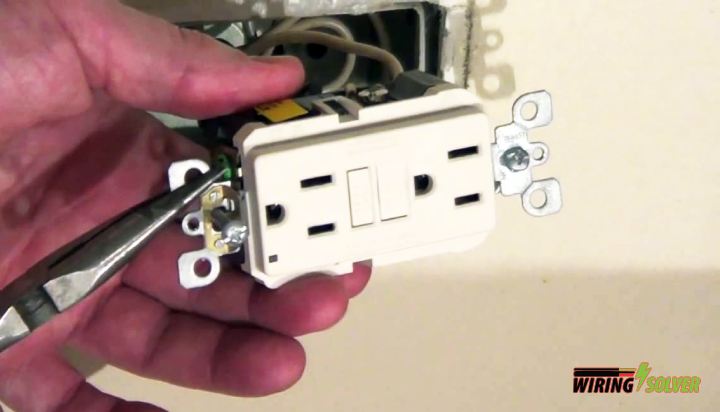Wire gauge is a key deciding factor of the decision regarding the size, rating, and application of a circuit breaker. The thicker a wire, the higher amount of amps it can handle. So, what size breaker for 14 Gauge wire?
A 14 Gauge wire should be the perfect choice for a 15 Ampere circuit breaker or a fuse. A 14 Gauge wire is rated to carry around 15 Amperes safely from one point to another given that the distance is less than 100 meters. Electrical current greater than 15 Amperes is not recommended for a 14 AWG wire.
In this article, I will discuss further how the wire gauge or AWG can affect the breaker and its performance and ratings. Along with providing further explanation regarding how you should make an accurate decision.

Which Breaker Size Should Be Used for a 14 Gauge Wire?
A breaker of 15 Amperes is perfect for a 14 Gauge wire. As with any ampere rating above that will cause the wire to overheat before the breaker is flipped. This could lead to various problems within the circuit.
The thicker a wire is; the more electricity it can handle without getting overheated. And each gauge of wire has its specific rating regarding the amount of electricity it can safely carry through it.
These ratings are based on several key factors. Such as the diameter of the wire, the material of the wire, and the temperature of the system.
Diameter of the wire:
The greater the diameter, the more amps it will be able to handle. For example, a 12 AWG wire will be able to 20 amperes. Whereas a 14 AWG wire can only handle 15 amperes.
Material of the wire:
Now, the material. Copper wires can carry electricity more efficiently than aluminum wires. Thus, if you were to replace a copper wire with an aluminum wire, you would require a thicker wire. Meaning a lesser AWG rating.
Temperature of the system:
The temperature of a system also plays a key role in the deciding factor. The cooler a system is; the less electricity it will be able to handle through it. This means that as the temperature increases, so does the capacity of the wire. This works for both copper and aluminum wires.
What size breaker should I choose?
So, what size breaker for 14 Gauge wire would be the perfect match? The answer is a 15 Ampere breaker. In this case, the breaker would flip way before the wire would have a chance to overheat.
This will prevent any risk of harm to the circuitry, such as electrical fires and electrocution. Therefore, it is best to choose a 15 Ampere breaker in combination with a 14 AWG wire.
How Can I Figure Out the Breaker Size Based on the Wire Gauge?
The breaker size and the wire size are proportionally related. The thicker the wire, the bigger the breaker size. In the chart below, I will outline what gauge wire you need for the maximum amperage rating of any given breaker.
Keep in mind that the gauge of copper and aluminum wires might occasionally change. The below chart is for copper wires. You can figure out what size breaker for 14 Gauge wire is needed from this chart.
Wire Gauge and Breaker Ampere Range Table
| Wire Gauge | Maximum Capacity |
| 18 AWG | 7 Amperes |
| 16 AWG | 10 Amperes |
| 14 AWG | 15 Amperes |
| 12 AWG | 20 Amperes |
| 10 AWG | 30 Amperes |
| 8 AWG | 50 Amperes |
| 6 AWG | 65 Amperes |
| 4 AWG | 70 Amperes |
| 2 AWG | 95 Amperes |
Following the chart provided above, you can easily decide the breaker size for any given wire gauge or AWG. For example, a wire gauge for 50 amps is 8. Keep in mind, the thicker a wire, the lesser its AWG rating will be.
For example:
A 12 AWG wire will be thicker than a 14 AWG wire. Therefore, it can handle more amperes than a 14 AWG wire. And the table supports this claim. A 12 AWG wire can handle 20 amperes while a 14 AWG wire can only handle 15 amperes.
If the perfect wire gauge and breaker combination is not chosen, it could lead to several electrical hazards within the circuit and spell harm to both the appliances and the users.
However, sometimes other factors might also play in. These may be invisible to the naked eye. Hence, it is always advised to consult with a professional electrician before proceeding with such tasks.
Why Can’t I Use 14 Gauge Wire on a 20 Ampere Circuit?
If the circuit is rated for 20 Amperes, the breaker won’t trip even when the current exceeds 15 Amperes, thus overheating the wire. Also, it is prohibited by the NEC code.
There is an important term known as “resistance heating”, which you should be familiar with. This will help you to understand the definite reasoning behind not being able to use 14 AWG wire on a 20 Ampere circuit.
When electricity is flowing, resistance in electrical conductors generates heat, and the quantity or magnitude of the generated heat varies inversely with the cross-sectional area of the conductor.
Example of an overheated system:
In a circuit regulated by a 20-amp breaker, 14 Gauge wire would overheat if the circuit was carrying the maximum amount of current because it has a lower cross-sectional area than 12 Gauge wire.
On the other hand, a 15-amp breaker will trip prior to the 14-gauge wire heating up. Additionally, 12 Gauge wire is permissible for a 15-amp circuit due to its even lower risk of overheating.
Overheating if left unattended could lead to electrical fires. And may even damage the internal circuitry and create a risk of electrocution. Hence, it is highly advised to use the accurate wire gauge and breaker combination.
Summary
This article should answer any of your queries regarding what size breaker for 14 Gauge wire would be perfect. And the factors which should contribute to your decision-making in this regard.
However, sometimes there are several other factors that may affect the decision-making in these scenarios. Therefore, it is advised to take a professional’s opinion on the matter before you proceed with the installation.


![Outlet VS Socket VS Receptacle [Key Differences]](https://wiringsolver.com/wp-content/uploads/2022/05/Outlet-VS-Socket-VS-Receptacle.jpeg)


![How to Fix a Doorbell That Doesn’t Ring? [Solved]](https://wiringsolver.com/wp-content/uploads/2022/06/How-to-Fix-a-Doorbell-That-Doesnt-Ring.jpeg)
